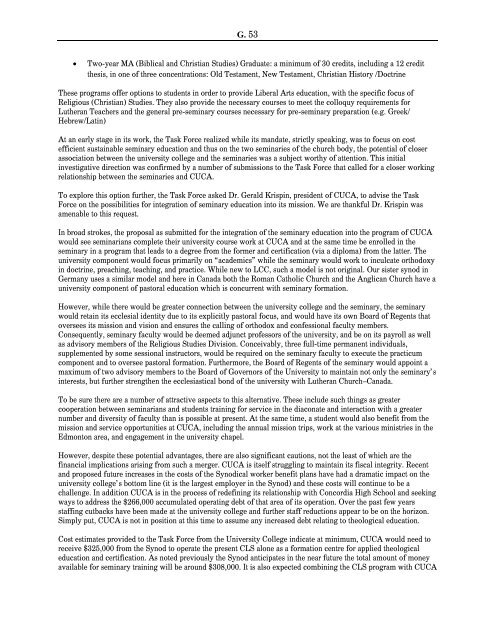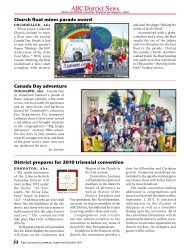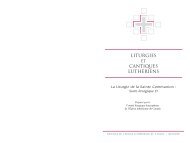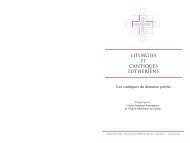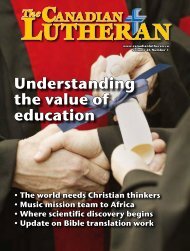Planned Giving Gift Summary - Lutheran Church-Canada
Planned Giving Gift Summary - Lutheran Church-Canada
Planned Giving Gift Summary - Lutheran Church-Canada
Create successful ePaper yourself
Turn your PDF publications into a flip-book with our unique Google optimized e-Paper software.
G. 53<br />
� Two-year MA (Biblical and Christian Studies) Graduate: a minimum of 30 credits, including a 12 credit<br />
thesis, in one of three concentrations: Old Testament, New Testament, Christian History /Doctrine<br />
These programs offer options to students in order to provide Liberal Arts education, with the specific focus of<br />
Religious (Christian) Studies. They also provide the necessary courses to meet the colloquy requirements for<br />
<strong>Lutheran</strong> Teachers and the general pre-seminary courses necessary for pre-seminary preparation (e.g. Greek/<br />
Hebrew/Latin)<br />
At an early stage in its work, the Task Force realized while its mandate, strictly speaking, was to focus on cost<br />
efficient sustainable seminary education and thus on the two seminaries of the church body, the potential of closer<br />
association between the university college and the seminaries was a subject worthy of attention. This initial<br />
investigative direction was confirmed by a number of submissions to the Task Force that called for a closer working<br />
relationship between the seminaries and CUCA.<br />
To explore this option further, the Task Force asked Dr. Gerald Krispin, president of CUCA, to advise the Task<br />
Force on the possibilities for integration of seminary education into its mission. We are thankful Dr. Krispin was<br />
amenable to this request.<br />
In broad strokes, the proposal as submitted for the integration of the seminary education into the program of CUCA<br />
would see seminarians complete their university course work at CUCA and at the same time be enrolled in the<br />
seminary in a program that leads to a degree from the former and certification (via a diploma) from the latter. The<br />
university component would focus primarily on “academics” while the seminary would work to inculcate orthodoxy<br />
in doctrine, preaching, teaching, and practice. While new to LCC, such a model is not original. Our sister synod in<br />
Germany uses a similar model and here in <strong>Canada</strong> both the Roman Catholic <strong>Church</strong> and the Anglican <strong>Church</strong> have a<br />
university component of pastoral education which is concurrent with seminary formation.<br />
However, while there would be greater connection between the university college and the seminary, the seminary<br />
would retain its ecclesial identity due to its explicitly pastoral focus, and would have its own Board of Regents that<br />
oversees its mission and vision and ensures the calling of orthodox and confessional faculty members.<br />
Consequently, seminary faculty would be deemed adjunct professors of the university, and be on its payroll as well<br />
as advisory members of the Religious Studies Division. Conceivably, three full-time permanent individuals,<br />
supplemented by some sessional instructors, would be required on the seminary faculty to execute the practicum<br />
component and to oversee pastoral formation. Furthermore, the Board of Regents of the seminary would appoint a<br />
maximum of two advisory members to the Board of Governors of the University to maintain not only the seminary’s<br />
interests, but further strengthen the ecclesiastical bond of the university with <strong>Lutheran</strong> <strong>Church</strong>–<strong>Canada</strong>.<br />
To be sure there are a number of attractive aspects to this alternative. These include such things as greater<br />
cooperation between seminarians and students training for service in the diaconate and interaction with a greater<br />
number and diversity of faculty than is possible at present. At the same time, a student would also benefit from the<br />
mission and service opportunities at CUCA, including the annual mission trips, work at the various ministries in the<br />
Edmonton area, and engagement in the university chapel.<br />
However, despite these potential advantages, there are also significant cautions, not the least of which are the<br />
financial implications arising from such a merger. CUCA is itself struggling to maintain its fiscal integrity. Recent<br />
and proposed future increases in the costs of the Synodical worker benefit plans have had a dramatic impact on the<br />
university college’s bottom line (it is the largest employer in the Synod) and these costs will continue to be a<br />
challenge. In addition CUCA is in the process of redefining its relationship with Concordia High School and seeking<br />
ways to address the $266,000 accumulated operating debt of that area of its operation. Over the past few years<br />
staffing cutbacks have been made at the university college and further staff reductions appear to be on the horizon.<br />
Simply put, CUCA is not in position at this time to assume any increased debt relating to theological education.<br />
Cost estimates provided to the Task Force from the University College indicate at minimum, CUCA would need to<br />
receive $325,000 from the Synod to operate the present CLS alone as a formation centre for applied theological<br />
education and certification. As noted previously the Synod anticipates in the near future the total amount of money<br />
available for seminary training will be around $308,000. It is also expected combining the CLS program with CUCA


